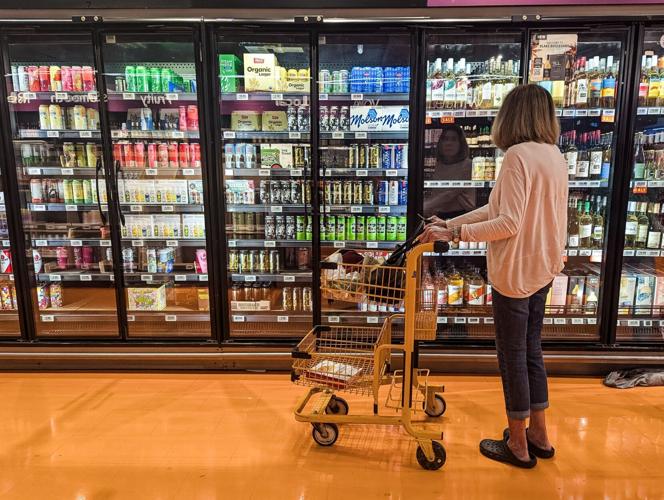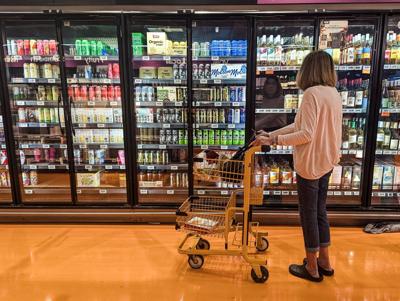A number of independent grocers are threatening to stop alcohol sales before a Jan. 1 deadline that requires them to take empties.
The warning from store owners echoes complaints from some of the province’s largest grocery chains, which have said they may stop selling wine and beer rather than set up deposit return programs for empty containers.
Gary Sands, the senior vice president of policy and advocacy at the Canadian Federation of Independent Grocers, said his grocers can’t meet Ontario’s onerous requirements to clean and sort empty bottles and cans and don’t have the space required to collect and store the items away from food.Â
”Where in the store does the government suggest they be dropped?” said Sands. “We’ve asked the government that for their suggestions and there’s just been a deafening silence.”
His organization met with government officials last week to once again relay those concerns, but Sands said the province “continued to say this is a transitional period and they continue to look at options.”
The province met separately with representatives of the Retail Council of Canada last week to discuss options for large chains such as Costco, Loblaw, Sobeys, Metro and Walmart, which have said taking empties poses health and safety risks as well as product contamination issues.
The retail council wouldn’t comment on negotiations, but Sebastian Prins, director of government relations in Ontario for the Retail Council of Canada, said in an email that it hopes “an alternative arrangement can be made to keep the sale of fresh produce separate from the collection of empty alcohol containers.”
The complaints by grocers could be a setback for Premier Doug Ford, whose plan to modernize alcohol sales has resulted in dozens of Beer Store locations closing, making it easy to purchase wine and beer in grocery and convenience stores, but more inconvenient when it comes to returning empties.
The Beer Store announced this week that another seven stores in the province would close on November 16.
The government said in an email that it continues to engage with industry stakeholders, but that it expects all retailers to comply with the conditions of their licence.
“Recycling return has been a  of licences for grocery stores since terms were announced in May 2024 and all grocery stores signed up with that understanding,” said Colin Blachar, director of media for Finance Minister Peter Bethlenfalvy.
Blachar said the regulations allow grocers to negotiate other arrangements, such as using alternative locations drop off and pick up of empties, or partnering with other businesses to deliver the service.Â
Ford has already promised the Beer Store up to $250 million to assist with the transition of beer sales, a price tag that could increase if the province capitulates to large grocery chains, which aren’t satisfied with the $0.02 per empty alcohol container they’ll receive as compensation from the government.
The retail council has said the amount is insufficient to support the staff and infrastructure needed to handle returns in a “safe, hygienic and efficient manner.”
But smaller grocers say money isn’t a big factor.
“I can’t have these contaminants coming into my business,” said David La Mantia, whose family has run La Mantia’s Country Market in Lindsay since 1928. The store has been selling beer since 2015, when the Liberal government under former premier Kathleen Wynne gave out licences to sell alcohol in a limited lottery.
“I wouldn’t say it’s a huge profit item,” said La Mantia. “What it does for us is draw traffic to our store. As independent grocers, we’re sort of a dying breed.”
A Competition Bureau of Canada report from 2023 recommended that all levels of government encourage the growth of independent grocers as a way to increase competition and bring down food prices.
“Last year, everyone was upset that these chain stores seem to control so much of the market,” said La Mantia, referring to the well of anger that rose up against the big chains over rising food prices.
“One of the solutions is help independents grow,” said La Mantia.
“The Doug Ford government is actually working against fostering the growth of independent grocers,” he said in reference to the requirement to take empties.
Gordon Dean, who owns a number of small grocery stores in the Ottawa Valley, has already set up deposit return programs in two of his stores, a requirement by the province from last fall for any grocer selling alcohol that is located more than five kilometres away from a Beer Store.
“I did not do it because I wanted to. I did it because I was obligated to,” said Dean, who was one of less than a dozen grocers who complied with the requirement.Â
Dean said he will continue to sell beer and wine come Jan. 1, when he will be required to set up return programs in all of his stores, because it’s a convenient option for customers in cottage country where the only competition is the LCBO.
But both grocery store owners question why the LCBO isn’t required to take empties and why convenience stores got a better deal. The stores were given a better margin on alcohol sales than grocers and aren’t required to take used bottles and cans.
“Why is it on me to take back cans and bottles sold by the convenience stores?” said La Mantia.
“Couche-Tard is a multinational corporation,” he said referring to Quebec-based Alimentation Couche-Tard, which operates more than 17,000 stores, including Circle K convenience stores, worldwide.
“7-Eleven is headquartered in Texas,” said La Mantia. “The Doug Ford government keeps talking about helping independents and helping businesses based in Ontario. Well, to my way of thinking it’s time that the rhetoric matched reality.”






























To join the conversation set a first and last name in your user profile.
Sign in or register for free to join the Conversation